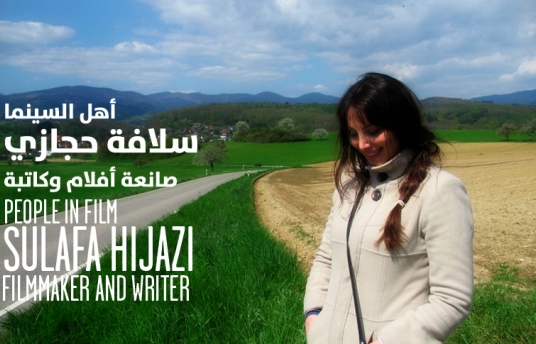People in Film: Sulafa Hijazi
Jan 17, 2012

Sulafa Hijazi is a writer, producer and director of animated TV series aimed at children. She studied at the Adham Ismail Centre for Fine Arts and the Higher Institute of the Dramatic Arts in Syria, where she majored in Theatre Literature. Hijazi’s productions include various types of animation, live drama, puppet shows, documentaries, print media, multimedia, and a conceptual media campaigns. At the beginning of 2010 she established blue.dar, a digital art production house linked with freelance artists, writers, researchers, educators, and animators. Hijazi has received more than 11 awards for her work. Earlier this month, she won six prizes for “The Jasmine Birds” at the International Children and Family Film Festival in Bangalore.
The Jasmin Birds Demo
إعلان فيلم طيور الياسمين
DFI: Why did you adopt animation as a career?
Hijazi: I grew up in a family that appreciates arts. My father, Abdul Nabi Hijazi, is a novelist and TV writer and the rest of my siblings work in drama and production. Witnessing their experiences, I wanted to be a director at an early age, and I was fond of plastic art and sculpture. I found in animation the combination of both.
DFI: There’s an oriental feel to your animation. How do you conceive them?
Hijazi: One of my goals was to create an artistic identity that represents the Arab child. There are a few Arab productions our children watch. It is important to connect children with their culture in order to develop their sense of nationalism. I tried a lot to go back to folk arts like performances, plastic arts, songs and poetry from the entire Arab world.
DFI: Your work is primarily directed at children. What are the criteria for family oriented films in you opinion?
Hijazi: It’s in accordance with the child’s needs at each stage. For instance, at early ages, we rely on repetition avoid complex colours and musical notes. The presentation should be simple, slow-paced and in a short period of time in order for the child to be able to absorb the information with ease. Children at this age have a short attention span.
When it comes to family films, in my opinion, they have to contain an exciting dramatic climax, with a simple narrative. We should also take into consideration that the films shouldn’t have any sexual connotations or violence, but a moral lesson even if indirectly presented.
DFI: It is a big challenge to direct for children – how do you work on making sure it appeals to them?
Hijazi: I did a lot of educational work for children. Pure educational goals won’t work if not presented in a fun and exciting manner. In general, I didn’t like the educational methods when I was a child. They were dry, more theoretical than practical and that’s what made me passionate. I am always looking for fun ways to present information using imagination and comedy.
DFI: What do you think of the state of children programming in the region?
Hijazi: The most successful TV experience for children was the Arabic version of “Sesame Street”. It had a fun and educational atmosphere for pre-school children and it became the reference of future educational programs in the Arab world. But unfortunately, we lack such quality children programming in our region because most people working in drama think that children’s TV is secondary. More than 60% of the Arab population consists of children and young adults. It is crucial to provide them with quality shows for a healthy development.
DFI: What about grown ups? Are you thinking of doing something for them?
Hijazi: Animation is such a beautiful language, with vivid imagination, and it can translate creative ideas with endless options. There are lots of ideas that I’d like to express through this medium. I am currently working on an animation film for adults on the concept of freedom, reflecting on what we’re going through at the moment. I have a lot to say in that regard.
DFI: You directed a short documentary, “The Memory Box”. Can you tell us more about it?
Hijazi: It was the product of an animation workshop for 40 kids from all of Syria. I asked the children to choose a memory and, with a team, I taught them the basics of animation in order to transform their memory into motion. The result was 40 short films. It was such a valuable experience, I decided to document it. Children shared their experiences and the camera followed them on their daily tasks.
DFI: We know that animation in the region is still at an early stage. What were your initial challenges?
Hijazi: There are no universities that teach animation in Syria, so we had to self-teach ourselves by looking at animation worldwide and bringing in experts with the help of private organisations in Syria. We sought the help of “Najem” and “Tiger Productions” who provided training. Together we were able to form an artistic and active hub, but it won’t really grow unless supported by the government.
DFI: What are your future projects?
Hijazi: I am working on a short film and I am preparing an animated 3D TV series for children.
DFI: What is your favorite animated film of all time?
Hijazi: “The Triplets of Belleville” by Sylvain Chomet.
Triplets of Belleville - Trailer
إعلان فيلم تريبلتس أوف بيلفيل
DFI: What do you think of Freej, the UAE animation series?
Hijazi: I admire the fact that it talks to the local community, especially UAE. It was able to promote the animated characters on a large scale and create an identity linked to the series and the merchandise.